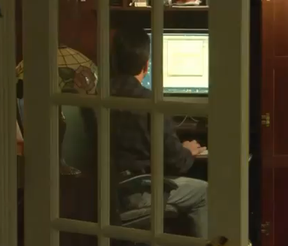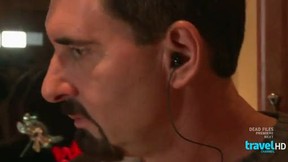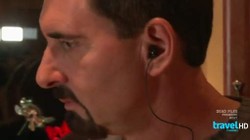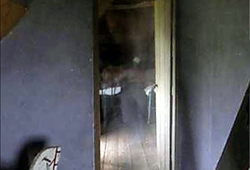 On Paranormal Straight Talk, Gary Galka spoke about the personal attacks, upon himself and his family, since he started manufacturing his ghost hunting devices.
On Paranormal Straight Talk, Gary Galka spoke about the personal attacks, upon himself and his family, since he started manufacturing his ghost hunting devices.
The situation became much worse after they were featured on Ghost Adventures in April 2012.
One of the most distressing moments came when a blogger, taking her cue from a website, tried to discredit the whole story. Her issue was that Melissa Galka had been drunk when she crashed her car.
That simply wasn't true. She had been at a party and alcohol was consumed, but post-mortem tests proved that she was below the legal drink-driving limit. It took legal action and a court injunction before the slander was removed from the internet.
However, the damage had been done. Suddenly Gary found himself publicly berated for not using his public platform to speak about the dangers of drunken driving. People openly yelled at him for channeling his energies into the paranormal, when he could have been leading a moral crusade instead.
I found this incredible. Even if Melissa had been paralytic at the wheel, what did that have to do with communication from beyond the grave? She would still have been on the other side.
Others took umbrage at his apparent 'cashing in on his daughter's death'. This deeply upsets Gary. He listed the charities that would do without funding, if he was to stop right now. He also pointed out how often he gives his equipment away for free, if poverty stricken individuals show promise with the technology.
There was yet a third common criticism, which was that he gave false hope to grieving families. When they 'think' they can hear their lost son or daughter through his EVP recorders, then they believe them still close by.
And the problem is? Gary got all defensive at this point, reeling off endless stories about how bereft parents had thanked him.
Personally, I don't think he should have even addressed the point. He gave hope to grieving families! If they even believed enough to seek out his devices and services, then such matters factor into their worlds.
I hate fundamentalism in any way, shape or form. That includes those so entrenched in their own certainties - that there is no afterlife and no way of contacting it - that they wish to trash all hope and all belief.
But Gary isn't taking all of the attacks lying down. He's challenged any scientist to allow him into their labs with his paranormal investigation equipment. He is so confident that he'll be able to reproduce his results under test conditions, that he's slapped down a $10k bet against it. The money, of course, will be donated to charity.
So far, no-one has taken up that particular gauntlet.


 Paternal care doesn't end with the grave. Gary Galka has the natural instincts of any good father. He wants to know that his wife and children are all okay; and that includes the one who died.
Paternal care doesn't end with the grave. Gary Galka has the natural instincts of any good father. He wants to know that his wife and children are all okay; and that includes the one who died.


 The ghost hunting gadgets that Gary Galka produced have since become legendary within the sector.
The ghost hunting gadgets that Gary Galka produced have since become legendary within the sector.


 On Paranormal Straight Talk, Gary Galka spoke about the personal attacks, upon himself and his family, since he started manufacturing his ghost hunting devices.
On Paranormal Straight Talk, Gary Galka spoke about the personal attacks, upon himself and his family, since he started manufacturing his ghost hunting devices.


 Obviously no-one would have wished that tragic accident to have occurred in 2004. That it did, and so profoundly affected a man with such technological genius, can only be a boon to the world of paranormal investigation.
Obviously no-one would have wished that tragic accident to have occurred in 2004. That it did, and so profoundly affected a man with such technological genius, can only be a boon to the world of paranormal investigation.





 St Tydecho's Churches in West Waleson 09/03/2014
St Tydecho's Churches in West Waleson 09/03/2014
 Goodies for an Outlander Premiere Partyon 03/06/2015
Goodies for an Outlander Premiere Partyon 03/06/2015
 Holocaust Memorial Day Interview with Rainer Höss, Grandson of Rudolf Architect of Auschwitzon 01/24/2015
Holocaust Memorial Day Interview with Rainer Höss, Grandson of Rudolf Architect of Auschwitzon 01/24/2015
 Romantic Valentine Gifts for an Outlander Fanon 01/16/2015
Romantic Valentine Gifts for an Outlander Fanon 01/16/2015



Comments
You don't need to turn me against Justinian. He caused so much damage out there. I can well believe that he fixed this one too. Aquinas was a wise man. Reading your final sentence, it's confirmed once again that you are too.
Aquinas says "Light opposes not light, nor does truth oppose truth." Ultimately, any religion which excludes truths must be in error to some degree. This means that to avoid this pitfall theology must be open ended and without a defensive wall against new ideas. Thus, for example, the decision of the council of Constantinople in 553 to ban belief in the pre-existence of the soul was not only short sighted, but has limited Christian theology since that time. There are many, of whom I am one who regard that council as a fix by Justinian and therefore no true council, so we don't follow its requirements. But you see here how this council has created a kind of wall against ideas.
Religions must avoid a situation in which doctrine becomes a prison for the mind rather than a springboard to higher understanding.
You've certainly sold me on the idea of reading that book. :)
One of the main reasons that Wicca fits me so well is its propensity to pick and choose from various religions, philosophies and still retain proven knowledge coming from the academe. It is definitely our strength.
Grimble was passing through a sacred grove through which islanders thought the souls of the dead passed. He could not decide whether he had seen a ghost or received the impact of the dying man's thoughts as he passed away. In this book Grimble is honest about his limitations as a person and attributes his silliness at times to being a young man. As an old man writing this book, he shows that he has learned wisdom and humility.
I have criticized the narrow materialistic philosophy of the enlightenment, but I also must say that religions which make a world-view purely out of their own scriptures are also at fault. Catholicism accepts that the Bible alone is not enough and that we must learn from what Scholastics knew as natural philosophy [science etc], and that's an advantage, though I don't think we have learned enough, but to base a world-view on the Bible alone, as creationists do, is a path to disaster.
Wow! It seems that Grimble had courage. So many deny their truths, considering the truth of peer pressure superior to their own senses.
And a resounding YES to all that you said in your first paragraph here.
That you have heard of this phenomenon from so many different death beds confirms my view that there is nothing abnormal about the paranormal. Normality was socially defined by materialists in the eighteenth century, at the enlightenment, but they seriously erred in making a norm out of their limited life experience and ontology. As a result those who have experiences out of the socially agreed box of the normal are belittled as hallucinating, of dubious sanity or simply lying. But they are not.
Sometimes a hardened skeptic is forced to change. A good case of this is in the book, A Pattern of Islands, by Arthur Grimble, in the chapter "The Limping Man of Makin Meang. " Grimble, a colonial officer, was intent on giving a rollicking to an islander for walking past and ignoring a command, only to find out that the man had already died when Grimble had seen and spoken to him. But Grimble had the courage to admit to his odd experiences. Others have kept quiet about them through fear.
I did know that, because after the Curate's lecture, I made it my business to find out. I spend a lot of my later teenage years telling folk about the Curate who didn't believe in ghosts. Ending with a punchline - 'I wonder if that included the Holy Ghost?'
I didn't know there was a name for the summoner, but the phenomenon is downright endemic amongst my friends and family. I've heard about it time and time again, relating to so many different deathbeds.
Do you know that Christianity has no teaching on ghosts, so the cleric who lectured you was overstepping the mark, presenting his personal opinion as Christian teaching. No council of the church has declared on the matter, and Scripture has not done so. But in the Bible story of Jesus' walking on water, the apostles were afraid that they were seeing a ghost. Jesus calmed them, but did not teach that ghosts are non-existent.
I have for some time believed that the standard heaven and hell model, where you are sent to one destination or the other and do not leave, is simplistic; I also believe that the afterlife is other than we think it is, containing many mysteries beyond mortal ken. Mark chapter 5 seems to show Jesus being unwilling to cast evil spirits into hell. This is not consistent with mainline theology. Only today I was talking to a bereaved in-law about the summoner, the phenomenon whereby the dying sometimes see their deceased relatives. It has happened in my family, and it seems common. Again, this is not consistent with mainline theology.
Apparently he thought so. He sent two friends to fetch me from my house ('Curate wants to see you...'), which was a mile and half walk to the church. I sat on his settee and was lectured about ghosts not being real and me being a bad Christian to 'pretend' to see them. I would be going to Hell if I didn't mend my ways. Blah-de-blah-de-blah.
Given that this was the 80s - at the height of the AIDS scare - there had been a sermon a few weeks before, which was downright homophobic. The vicar actually preached that homosexuality was a sin, with my gay friend sitting right alongside me. I was already feeling a little disillusioned with the church, and the Curate effectively ensured that I'd be walking away after that evening.
Years later, I know that there are good and bad clerics in every religion. It shouldn't reflect upon the religion itself. It sound like you and your son have met more than your fair share of the bad ones too.
What! He had the impertinence to demand this of you? Does he control your perceptions? Is he a feudal superior to summon you like a vassal? I think not. This was a man with an ego incommensurate with his worth. The arrogance of the man reminds me of a case. I was quite irritated by the university chaplain who interviewed my son after Peter went to him to say that he had seen a ghost. Peter had telephoned me and we had discussed it, but the chaplain just said that it was something in his mind and gave no help whatsoever. No it wasn't, the temperature had dropped and a ball in his room was vibrating as it passed. The lad was terrified. I gave him more help than the chaplain did.
When I spent three years in the religious life [I was not very close to ordination] I developed an animosity to clerics who loved power. I had several serious disagreements with other students [and the superior] about authoritarianism, the corruption of religion and the way that some clerics love to hang on to power systems. The superior waved me a fond farewell at the door, happy to see the back of me. You might gather that I am not universally popular with the members of the clergy. Don't think that because I go to mass I am loved by every cleric. I think for myself.